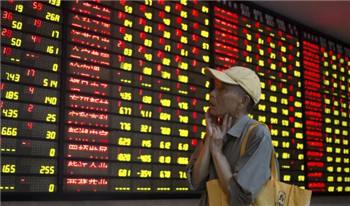
The world has finally woken up to the magnitude of what is happening in China. After months in which events in Europe overshadowed first the puffing up and then the popping of China’s stock market bubble, daily oscillations on the country’s once-obscure stock exchanges are being blamed for everything from weak oil prices to falling emerging market currencies.
世界终于意识到中国正在发生的事情的重大性。此前数月,欧洲的事件先后盖过了中国股市泡沫的膨胀以及随后的爆裂。现在,人们正将从油价疲软到新兴市场货币下跌的一切事情,归咎于中国曾经不受关注的证券交易所每日的震荡。
This is overdone. China’s stock market performance has rarely had much, if any, correlation with the country’s real economy, let alone that of the rest of the world. Barely 20 years old and poorly regulated, the stock market still has more in common with the gambling casinos of Macau than with global exchanges in western capitals such as New York, London or Tokyo. Nor are foreign investors much exposed to Chinese equities. Because of tight quotas, only a tiny proportion of China’s stock market — about 3 per cent — is owned by foreigners. That should make what is happening in China’s financial markets akin to an explosion in a far off cave.
这就过头了。中国股市的表现即使真的和该国实体经济有关,相关性也从来不大,更不必说和世界其他地方有什么相关性了。刚刚迈过20个春秋且监管不力的中国股市和澳门赌场之间的共同点,依然要多于和纽约、伦敦或者东京等西方国家首都的全球性交易所的共同点。外国投资者对中国股票的敞口也不大。由于严格的配额,中国股市只有微小的一部分——大约是3%——目前为外国人持有。这样看来,中国金融市场正在发生的事情应该近似于一个遥远的洞穴发生的一场爆炸。
Even in China itself, the effects on the real economy ought not to be large. As Arthur Kroeber, head of Gavekal Dragonomics, points out, only 7 per cent of urban Chinese have money in the market. If they lose their shirt, that should not overly affect aggregate spending. In any case, most investors are in the money. The market more than doubled in the 18 months before it peaked in mid-June. Only the latest of latecomers have seen their investments slide.
即使在中国,实体经济遭受的影响应该也不大。正如龙洲经讯(Gavekal Dragonomics)主管葛艺豪(Arthur Kroeber)指出的,只有7%的中国城市居民向股市中投入了资金。就算他们赔光了,这也不会过于影响总支出。不管怎样,大多数投资者还是发了一笔财。在6月中旬达到顶峰之前,股市在之前的18个月中翻了一倍多。只有最晚入市的一批人的投资亏损了。
Does that mean there is no need to worry? Absolutely not. There could be several big ripple effects. First, the wild oscillations have shaken faith in the competence of China’s technocrats. For years, bureaucrats have defied doom猀愀礀攀爀猀 predicting that China’s hybrid system of central planning and market forces would collapse under its own contradictions. Now the bureaucrats don’t look so good. Initially, they pumped up the market in what looks like an ill-conceived effort to enact what has been called the world’s biggest debt-to-equity swap. Worried that loans made to companies as part of a massive stimulus programme would turn sour, technocrats encouraged a stock market binge. Their subsequent actions to stop the bubble from bursting have looked anachronistic and heavy-handed. They have virtually criminalised selling stocks, banning anyone who owns more than 5 per cent of a company from offloading shares.
这是否意味着我们无需忧虑?绝对不是。可能会有几个大的连锁反应。首先,股市的剧烈震荡动摇了对中国技术官僚能力的信心。多年来,中国官僚一直藐视灾难预言者,后者预测中国集中央计划和市场力量于一身的混合体制将因自身矛盾而崩溃。现在这些官僚看上去可不大好。最初,他们采用了一种看起来考虑不周的做法,推高股市以实行被称为世界上规模最大的“债转股”。由于担忧在一项大规模刺激计划中借给企业的贷款可能变成坏账,技术官僚鼓励了一轮股市狂潮。之后他们为阻止股市泡沫爆裂而采取的行动看起来过时而粗暴。他们实际上将抛售股票非法化,禁止任何持有一家企业5%以上股票的人卖出股票。
“This has set the Chinese stock market back 10 years,” says one close observer of China’s capital markets. Not only have such blunderbuss tactics revealed panic and outmoded instincts, they have not worked. After Sisyphean efforts to push stock prices up by 15 per cent, technocrats must have watched open-mouthed as they sank back 8.5 per cent in a single session. The prices are still 70 per cent above last year’s level, when the economy and corporate profits were in much better shape. The assumption must be that, if the authorities stop their efforts to push the boulder uphill, the forces of gravity will quickly take their toll.
“这让中国股市倒退了10年,”一位密切观察中国资本市场的人士说。这些粗陋的做法不仅暴露了恐慌和过时的本能反应,还未能奏效。在通过如西西弗斯推巨石一般的努力,将股价推高15%以后,技术官僚们一定是目瞪口呆地看着股价在1个交易日内下跌了8.5%。现在股价依然比去年高出70%,而去年的经济状况和企业盈利都比现在好得多。可以假定,如果当局停止将巨石推上山,重力一定会迅速发挥作用。
Second, the assumption that China will gradually move towards a more market-based system might need to be reassessed. Recent events could persuade authorities they have been moving too fast. That could have an impact on everything from the pace at which China opens its capital account and makes the renminbi convertible to how fast it liberalises domestic interest rates.
其次,认为中国将逐步迈向更市场化的体制的假设,可能需要重新评估。最近的事件可能会让当局认为他们的步子迈得太快。这可能会影响到方方面面,从中国开放资本账户、使人民币可兑换的步调,到中国国内利率自由化的速度。
“What this reveals is that there is still a fundamental tension in China between a desire to intervene and a desire to let market forces operate,” says Fred Neumann, chief Asia economist at HSBC. That could affect whether the International Monetary Fund includes the renminbi in its special drawing rights, or whether China’s A-shares gain access to the MSCI Emerging Market index. Certainly, the clumsy intervention by authorities has had a chilling effect on global sentiment. Larry Fink, chief executive of BlackRock, said foreign investors would need to reassess.
“这揭示出,在干预的愿望和让市场力量发挥作用的愿望之间,中国仍存在根本性紧张,”汇丰银行(HSBC)首席亚洲经济学家范力民(Fred Neumann)表示。这可能会影响国际货币基金组织(IMF)是否将人民币纳入特别提款权(SDR),或者中国A股是否能够被纳入MSCI新兴市场指数。毫无疑问,当局生硬的干预给全球市场情绪带来了寒蝉效应。贝莱德(BlackRock)首席执行官拉里芬克(Larry Fink)称,外国投资者需要重新评估。
The third possible impact is on China’s growth. True, it is not obvious how a market fall will spill over into the real economy. China has bucked sharp stock market slides before. This time, though, the risks are higher. Many in瘀攀猀琀漀爀猀 have borrowed heavily to buy shares. If authorities cannot stop a slide, some banks and brokerages could be at risk. The confidence-sapping oscillations are also taking place against the background of a much softer economy, one probably growing more slowly than the official 7 per cent figure suggests. If another point or two were shaved off growth, it could send very real tremors around the globe. Since 2008, China has been the motor of the world. The travails of its stock market add to evidence that this motor is spluttering.
第三,这可能影响中国的增长。的确,股市下跌将如何波及实体经济并不明显。中国经济曾经在股市暴跌时逆势上行。然而,这一次的风险更高。许多投资者借入大量资金购买股票。如果当局无法阻止股市下跌,一些银行和券商可能将面临风险。并且,眼下削弱信心的股市震荡发生在经济大幅放缓的背景下。当前中国的经济增长很可能比官方给出的7%的数字要慢。如果中国的增长率再下降1个或者2个百分点,这可能向全球传递真正的震颤。自2008年以来,中国一直是全球的引擎。中国的股市阵痛进一步证明,这台引擎正在发生故障。












